2019年春四年级英语下册Module9Unit2Didyouhaveaniceholiday教案设计外研版(三起)
四年级英语下册 Module 9 Unit 2 Did you have a nice holiday参考教案 外研版(三起)
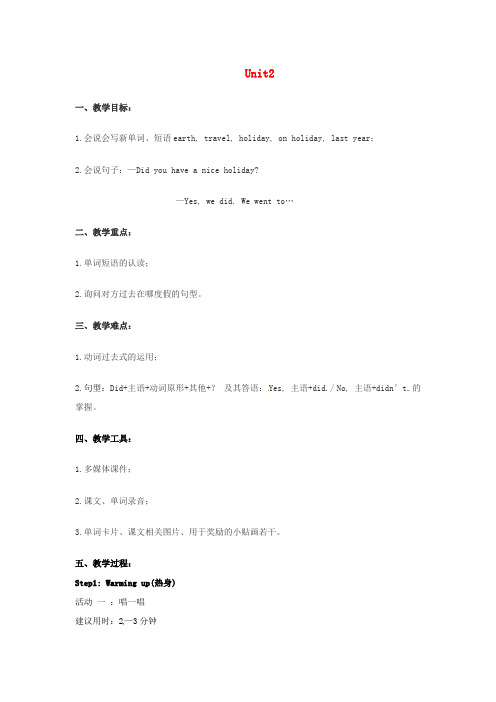
Unit2一、教学目标:1.会说会写新单词、短语earth, travel, holiday, on holiday, last year;2.会说句子:—Did you have a nice holiday?—Yes, we did. We went to…二、教学重点:1.单词短语的认读;2.询问对方过去在哪度假的句型。
三、教学难点:1.动词过去式的运用;2.句型:Did+主语+动词原形+其他+?及其答语:Yes, 主语+did./ No, 主语+didn’t.的掌握。
四、教学工具:1.多媒体课件;2.课文、单词录音;3.单词卡片、课文相关图片、用于奖励的小贴画若干。
五、教学过程:Step1: Warming up(热身)活动一:唱一唱建议用时:2—3分钟教师播放歌曲大家一起跟着唱做,可以活跃课堂气氛,调动学生们的学习积极性。
Step2:Presentation(呈现新课)1.新课导入建议用时:2—3分钟活动二:口语练习教师播放PPT上关于度假的图片,比较两组句子“I am on holiday./ I was on holiday.”由此引出本课话题。
教师让学生说说自己都去过那些地方度假游完,在班里分享自己的经历。
以此引出本课话题。
活动三:知识回顾教师以旅游为话题带领学生复习上节课所学过的交通方式的英语表达,为本节课接下来要学习的内容做铺垫。
2.教授新知建议用时:2—3分钟教师播放课文第一部分Listen point and say的录音,让学生自己翻译出对话的意思,并且跟读录音。
最后由学生自己朗读句子并画出自己不认识的单词。
3.学习新句型建议用时:2—3分钟教师给学生讲解第一部分对话中出现的新句型一般疑问句:Did+主语+动词原形+其他+?及其答语:Yes, 主语+did./ No, 主语+didn’t.4.课文学习建议用时:3—4分钟教师播放课文第二部分Listen and say的课文录音,学生先跟读后由教师领读并讲解。
Module9Unit2Didyouhaveaniceholiday?(教案)-英语四年级下册

外研版四年级下册英语Module 9《Unit 2 Did you have a nice holiday?》教案一、教材分析:本课是外研版四年级下册Module 9《Unit 2 Did you have a nice holiday?》,主要围绕假期的话题展开。
通过本课的学习,学生将学习新词earth,掌握句型Did you...?,并能够阅读和理解课文大意。
二、教学目标:语言知识目标:1. 全体学生能够在所给的语境中理解本课的新词earth的含义。
2. 全体学生能理解并运用Did you...?这一句型。
3. 能够阅读和理解课文大意。
语言技能目标:1. 全体学生能认读earth生词。
2. 全体学生听懂并进行Did you...?的问答。
3. 大部分学生能通过阅读技巧,抓关键信息,读懂文本。
学习策略目标:1. 主动学习,初步感知和运用阅读方法。
2. 积极思考,并与他人交流合作,共同完成学习任务。
三、教学重难点教学重点:1. 学生掌握阅读方法,理解课文大意。
2. 在活动中渗透阅读技巧,提取Who,where,what,How,Why的关键信息。
教学难点:1. 掌握阅读技巧。
2. 培养学生的质疑能力,提升学生的思维品质。
四、学情分析:学生是四年级的学生,已经掌握了一定的英语基础知识,具备一定的听说读写能力。
他们对于新词和句型的学习具有一定的接受能力,但在阅读理解方面可能存在一定的困难。
因此,在教学过程中需要设计多样化的活动,引导学生主动思考和合作交流。
五、教学过程:Step 1: Warmup1. Greet the students and ask them about their recent holidays. For example, "Good morning, class! How are you today?I hope you all had a great holiday. Now, can you raise your hand and share one fun thing you did during your holiday?"2. Show pictures of different holiday activities, such as swimming, hiking, or visiting a museum. Ask the students to discuss in pairs or small groups what they did during their holidays. Encourage them to use plete sentences to describe their activities.3. Have a class discussion and elicit responses from the students. Ask followup questions to encourage more detailedanswers, such as "Did anyone go swimming? Where did you go swimming? How was it?"Step 2: Presentation1. Introduce the new word "earth" by showing a picture or using real objects related to the earth, such as a globe or a map. Hold up the object and say, "This is the earth. Can you repeat after me? Earth."2. Elicit the meaning of "earth" from the students by asking questions like, "What do we call the planet we live on?" or "What is the name of our home planet?" Listen to their answers and provide a simple definition if needed, such as "The earth is the planet we live on."3. To practice the pronunciation of "earth" together as a class, lead a repetition exercise. Say the word clearly and have the students repeat it several times, emphasizing the correct pronunciation and intonation. Encourage them to pay attention to the vowel sound in the word.Teacher: "Now let's practice saying the word 'earth' together. Repeat after me: 'earth'."Students: "Earth."Step 3: Language Practice1. Introduce the sentence pattern "Did you...?" by askingthe students questions about their holidays using this structure. For example, "Did you go swimming? Did you visit any interesting places?" Model the correct responses and encourage the students to answer using the same sentence pattern.Teacher: "Now, let's talk about your holidays using the sentence pattern 'Did you...?' For example, I can ask, 'Did you go swimming?' and you can answer, 'Yes, I did. I went swimming at the beach.' Let's try it together."Student 1: "Did you go swimming?"Student 2: "Yes, I did. I went swimming at the pool."Teacher: "Great job! Now, let's continue with more questions and answers."2. Organize a pair or group activity where students take turns asking and answering questions about their holidays using "Did you...?" For example, one student can ask, "Did you go hiking?" and the other student can respond, "Yes, I did. I went hiking in the mountains."Teacher: "Now, I want you to work in pairs or small groups. Take turns asking and answering questions about your holidays using the sentence pattern 'Did you...?' Remember to use plete sentences. You can start with questions like 'Did you visit any interesting places?' or 'Did you try any new activities?'"Students work in pairs or groups, asking and answering questions about their holidays using the sentence pattern "Did you...?" The teacher moves around the classroom, monitoring the students' conversations and providing assistance when needed.Teacher (providing guidance): "That's great! Now, try asking followup questions to get more information. For example, if your partner says they went hiking, you can ask 'Where did you go hiking?' or 'How was the hiking trail?'"Step 4: Reading prehension1. Divide the class into small groups and distribute copies of the reading passage to each group. The passage should be related to holidays or vacation experiences.2. Explain the purpose of the reading task and introduce the key questions: Who, where, what, how, why. Write these questions on the board.3. Instruct the students to read the passage silently and underline or circle the answers to the key questions. Encourage them to read carefully and pay attention to the details.4. After reading, encourage the students to discuss their answers within their groups and justify their choices. They can take turns sharing their answers and discussing any differences or similarities.5. Conduct a class discussion to check the students' understanding and elicit their answers to the key questions. Ask different groups to share their answers and provide feedback on their prehension.Step 5: Consolidation and Application1. Ask the students to work individually and write a short paragraph about their own holidays using the sentence pattern "Did you...?" For example, "Write a paragraph about your holiday activities. Start each sentence with 'Did you...?' and describe what you did during your holiday."2. Provide a writing template or guide to support the students in organizing their ideas. Include sentence starters like "Did you go to any interesting places? Did you try any new activities? Did you meet any new friends?"3. Encourage the students to share their paragraphs witha partner and give feedback on each other's writing. They can discuss what they liked about their partner's paragraph and offer suggestions for improvement.六、板书设计:Unit 2 Did you have a nice holiday?Did you...?Who? Where? What? How? Why?七、教学反思:本节课通过引导学生讨论假期活动、介绍新词并练习句型,以及进行阅读理解活动和写作练习,全面培养学生的听说读写能力。
四年级下英语教案-Module9Unit2Didyouhaveaniceholidy-外研社(三起)
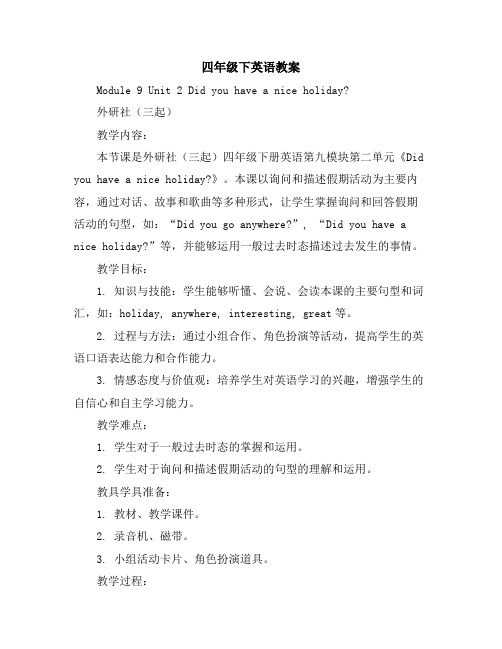
四年级下英语教案Module 9 Unit 2 Did you have a nice holiday?外研社(三起)教学内容:本节课是外研社(三起)四年级下册英语第九模块第二单元《Did you have a nice holiday?》。
本课以询问和描述假期活动为主要内容,通过对话、故事和歌曲等多种形式,让学生掌握询问和回答假期活动的句型,如:“Did you go anywhere?”, “Did you have a nice holiday?”等,并能够运用一般过去时态描述过去发生的事情。
教学目标:1. 知识与技能:学生能够听懂、会说、会读本课的主要句型和词汇,如:holiday, anywhere, interesting, great等。
2. 过程与方法:通过小组合作、角色扮演等活动,提高学生的英语口语表达能力和合作能力。
3. 情感态度与价值观:培养学生对英语学习的兴趣,增强学生的自信心和自主学习能力。
教学难点:1. 学生对于一般过去时态的掌握和运用。
2. 学生对于询问和描述假期活动的句型的理解和运用。
教具学具准备:1. 教材、教学课件。
2. 录音机、磁带。
3. 小组活动卡片、角色扮演道具。
教学过程:1. 导入:通过歌曲《Holiday Song》导入本课主题,激发学生的学习兴趣。
2. 新课呈现:通过课件展示本课的主要句型和词汇,引导学生跟读、模仿。
3. 小组合作:学生分组进行角色扮演,练习本课的对话。
4. 巩固练习:通过游戏、竞赛等形式,巩固本课所学内容。
板书设计:1. 本课的主要句型:Did you go anywhere? Did you have a nice holiday?2. 本课的主要词汇:holiday, anywhere, interesting, great 等。
作业设计:1. 听录音,跟读课文。
2. 抄写本课的主要句型和词汇。
3. 用一般过去时态写一篇关于自己假期的短文。
外研版三起点四年级英语下册Module9Unit2、Did、you、have、a、nice、holiday课件1

Module 9 Unit 2 Did you have a nice holiday? --Period 2
Review words
on holiday 度假
famous West Lake
by train
单词游戏
全班分成两组,老师出示单词, 学生快速的说出看到的单词,
你们的采访结果。 C:然后把你们的采访结果用英语句子汇报。 D: 老师请不同的小组上台汇报自己的采访结果。
1.给爸爸妈妈介绍自己的海报内容, 请他们评价。 2.预习下一节课的内容。
说的最快最对的小组加分。
visit holiday
people
beautiful tell
these earth
famous
told West Lake
Let's review
你能复述对话吗?
Let's sing a song!
Do you know these places?
visit ---- visited go----went see----saw want to......
1.有表情地朗读,并注意 模仿语音语调。
2.注意指读哦!
学生分角色表演对话内容, 老师评出优秀表演小组。
创意编写活动 学生四人一组,将歌曲改编, 并且向大家展示你们的新歌曲。老师
评出创意小组!
一起来朗读吧!
B:学生模仿课本的对话,采访班里其他成员是 如何度过假期的,以及在哪里度过的。并且记录
四年级下册英语教案-Module9 Unit2 Did you have a nice holida
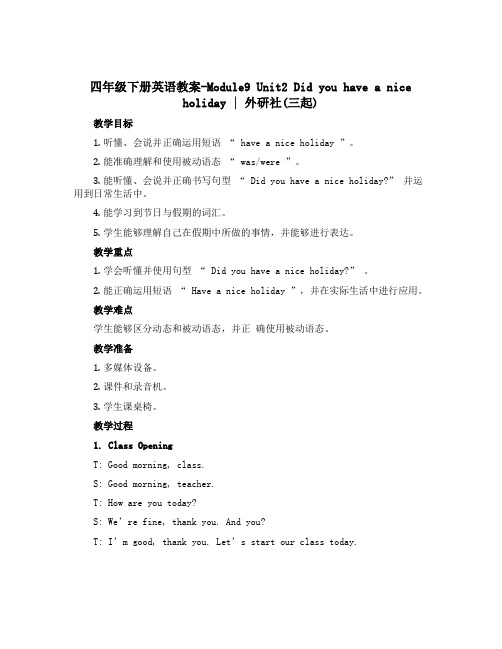
四年级下册英语教案-Module9 Unit2 Did you have a niceholiday | 外研社(三起)教学目标1.听懂、会说并正确运用短语“ have a nice holiday ”。
2.能准确理解和使用被动语态“ was/were ”。
3.能听懂、会说并正确书写句型“ Did you have a nice holiday?” 并运用到日常生活中。
4.能学习到节日与假期的词汇。
5.学生能够理解自己在假期中所做的事情,并能够进行表达。
教学重点1.学会听懂并使用句型“ Did you have a nice holiday?” 。
2.能正确运用短语“ Have a nice holiday ”,并在实际生活中进行应用。
教学难点学生能够区分动态和被动语态,并正确使用被动语态。
教学准备1.多媒体设备。
2.课件和录音机。
3.学生课桌椅。
教学过程1. Class OpeningT: Good morning, class.S: Good morning, teacher.T: How are you today?S: We’re fine, thank you. And you?T: I’m good, thank you. Let’s start our class today.2. RevisionT: Yesterday we talked about our hobbies. Who can tell me what they did last weekend?S: I played football with my friends.T: That’s great. Did anyone go on a trip or have a holiday?S: (students answer)T: Okay, now let’s talk about holidays. Do you like holidays?S: Yes, we do.3. PresentationT: Today we will learn how to talk about holidays. Look at the screen and listen to the recording.(Play the recording)T: What did you hear?S: Did you have a nice holiday?T: Yes, that’s right. This is a very common question we ask when someone comes back from a holiday.T: Repeat after me: “Did you have a nice holiday?”S: (students repeat)T: Do you know what “have a nice holiday” means?S: It means to have a good time on holiday.T: That’s right. Now listen again and repeat after me.(Play the recording)T: Did you notice something new?S: The word “was”.T: Yes, that’s right. “Was” is a form of the verb “be” and it is used in the past tense. Listen again and repeat after me.(Play the recording)T: Do you understand?S: Yes.4. PracticeT: Let’s practice using “was” in a sentence. (Teacher writes a sentence on the board.) “I was at home.”T: Now let’s make it into a question. (Teacher writes a question on the board.) “Were you at home?”S: (students repeat)T: Great! Now let’s practice using “Did you have a nice holiday?” Repeat after me.S: (students repeat)T: Now I will ask the question to you individually and I want you to answer whether you had a nice holiday or not.S: (students answer)5. ProductionT: Now, I want you to draw a picture or write a story about your holiday. Use the phrases and sentences we learned today.S: (students draw or write)6. ClosingT: Okay, class. That’s all for today. Have a nice day and enjoy your holidays!总结在这节课中,学生能够了解到节日与假期的相关词汇。
四年级下册英语教案Module9Unit2Didyouhaveaniceholiday外研社(三起)
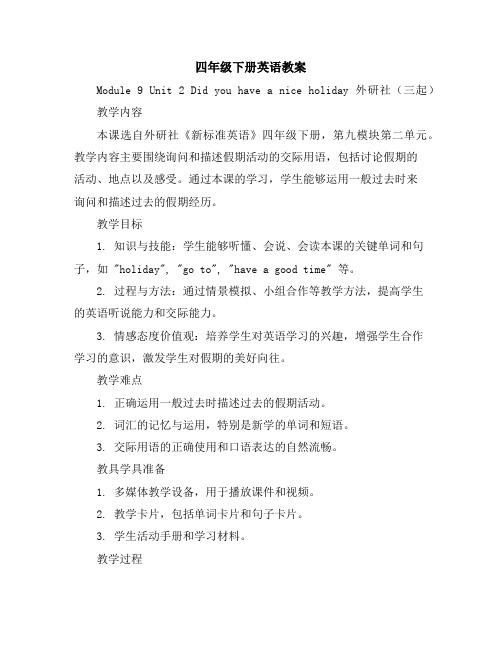
四年级下册英语教案Module 9 Unit 2 Did you have a nice holiday 外研社(三起)教学内容本课选自外研社《新标准英语》四年级下册,第九模块第二单元。
教学内容主要围绕询问和描述假期活动的交际用语,包括讨论假期的活动、地点以及感受。
通过本课的学习,学生能够运用一般过去时来询问和描述过去的假期经历。
教学目标1. 知识与技能:学生能够听懂、会说、会读本课的关键单词和句子,如 "holiday", "go to", "have a good time" 等。
2. 过程与方法:通过情景模拟、小组合作等教学方法,提高学生的英语听说能力和交际能力。
3. 情感态度价值观:培养学生对英语学习的兴趣,增强学生合作学习的意识,激发学生对假期的美好向往。
教学难点1. 正确运用一般过去时描述过去的假期活动。
2. 词汇的记忆与运用,特别是新学的单词和短语。
3. 交际用语的正确使用和口语表达的自然流畅。
教具学具准备1. 多媒体教学设备,用于播放课件和视频。
2. 教学卡片,包括单词卡片和句子卡片。
3. 学生活动手册和学习材料。
教学过程1. 导入:通过展示一些假期的图片,引导学生谈论自己的假期经历,激发学生的学习兴趣。
2. 新授:利用多媒体课件展示本课的关键单词和句子,讲解语法点和交际用语。
3. 练习:通过听录音、模仿跟读、角色扮演等活动,让学生练习本课的重点内容。
4. 巩固:进行小组活动,让学生在模拟的情景中运用所学知识进行交流。
板书设计1. 关键单词和短语。
2. 重点句子和交际用语。
3. 语法点的简单说明。
作业设计1. 书面作业:完成学生活动手册的相关练习。
2. 口头作业:回家后与家长用英语交流自己的假期经历。
3. 扩展作业:查找一些关于假期的英语资料,如旅游广告、假期故事等,下节课分享。
课后反思1. 教学方法是否有效,学生是否积极参与。
四年级英语下册 Module 9 Unit 2 Did you have a nice holida

Unit 2 Did you have a nice holiday?一、看图补全单词。
1. 2. 3. p__stc__rd c__nc__rt e__r__h 4. 5. c__us__n tr__v__l二、为下列图片找到正确的英文,将序号填在括号里。
( ) ( ) ( ) ( ) ( )1. lots of people2. some funny animals3. have a nice holiday4. the Great Wall5. go to a concert三、读句子和对话,圈出正确的答案。
1. Did you (A. come B. came) by train?2. (A. Does B. Did) she live in Beijing last week?3. Look! It (A.is B. was) a postcard from Tianjin.4. We (A. went B. go) to a concert last week.5. —Did he visit San Francisco?—Yes, he (A. does B. did).四、情景选择。
( ) 1. 当你想表达“欢迎来到我们的学校。
”时,应该说:________A. Welcome to my home.B. Welcome to our school.( ) 2. 当别人问你昨天怎么去的杭州时,你可以回答:________A. I went to Hangzhou by plane yesterday.B. I go to Hangzhou by plane today.( ) 3. 当你想告诉别人自己住在北京时,你会说:________A. I live in London.B. I live in Beijing.( ) 4. 如果你想知道以前Daming是否住在纽约,可以这样问别人:________A. Did Daming live in New York?B. Did Daming live in London?五、选出与下列句子或对话意思相符的图片。
小学英语外研版四年级下册《Module9Unit2Didyouhaveaniceholiday》课件
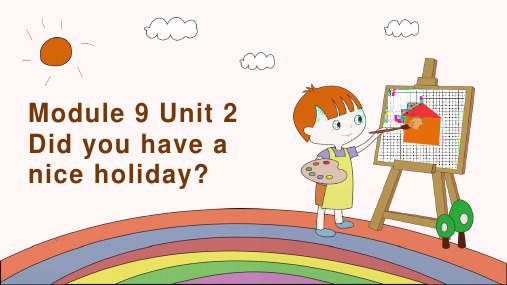
Let's sing.
Let's sing again.
Let'பைடு நூலகம் guess and say.
Did you go to ... last year?
Yes, I did. No, I didn't. I went to ....
Look then say.
Module 9 Unit 2 Did you have a nice holiday?
Look at Kaqi and Qika. They went to the earth.
What did they see?
LoKokaaqt iBaobnodanQd ihkisafrwienedn. tThteoy twheent etoatrhtehe.arth too. WWhhTaahtt ddeiiydd ttshheeayywsdeoae??panda and a hippo.
They went to the earth. They had a nice holiday. They saw the people. They took photos.
weren't
were beautiful
nice
Did they have a nice holiday? Yes, they did.
Hangzhou where
what
visited the West Lake
by train
how
when
last week
Dalong went to Hangzhou last week. He went there by train. He visited the West Lake.
四年级下册英语教案 Module 9 Unit 2 Did you have a nice holi
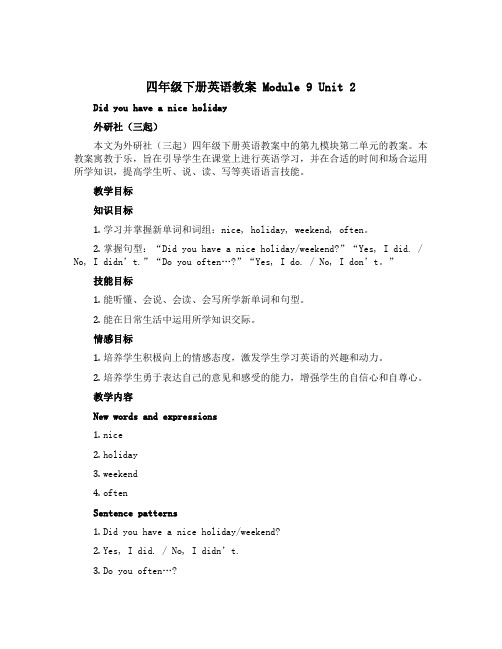
四年级下册英语教案 Module 9 Unit 2Did you have a nice holiday外研社(三起)本文为外研社(三起)四年级下册英语教案中的第九模块第二单元的教案。
本教案寓教于乐,旨在引导学生在课堂上进行英语学习,并在合适的时间和场合运用所学知识,提高学生听、说、读、写等英语语言技能。
教学目标知识目标1.学习并掌握新单词和词组:nice, holiday, weekend, often。
2.掌握句型:“Did you have a nice holiday/weekend?”“Yes, I did. / No, I didn’t.”“Do you often…?”“Yes, I do. / No, I don’t。
”技能目标1.能听懂、会说、会读、会写所学新单词和句型。
2.能在日常生活中运用所学知识交际。
情感目标1.培养学生积极向上的情感态度,激发学生学习英语的兴趣和动力。
2.培养学生勇于表达自己的意见和感受的能力,增强学生的自信心和自尊心。
教学内容New words and expressions1.nice2.holiday3.weekend4.oftenSentence patterns1.Did you have a nice holiday/weekend?2.Yes, I did. / No, I didn’t.3.Do you often…?4.Yes, I do. / No, I don’t.DialogueA: Did you have a nice holiday? B: Yes, I did. I went to the beach with my family. A: That sounds great. Did you swim in the sea? B: Yes, we did. We had a lot of fun. A: Do you often go to the beach? B: Yes, I do. My family loves the beach.教学过程Step 1: Warm-up (10 minutes)1.Greet the students.2.Ask the students about their holidays or weekends and encourage them to share their experiences with the class.3.Write down any new words or expressions that the students use on the board.Step 2: Presentation (15 minutes)1.Introduce the new words and expressions to the students using flashcards or other visual aids.2.Drill the new words and expressions with the class.3.Model the sentence patterns for the students and have them repeat after you.Step 3: Practice (25 minutes)1.Divide the students into pairs.2.Have the pairs practice the dialogue from the text.3.Walk around the classroom and listen to the students practicing.Step 4: Extension (10 minutes)1.Ask the students to come up with their own sentences using the new words and expressions.2.Have the students share their own sentences with the class.Step 5: Summary and homework (5 minutes)1.Review the new words and expressions with the class.2.Assign homework to the students.教学反思本节课教学内容紧凑、简单明了,便于学生们理解和掌握。
2019年四年级英语下册Module9Unit2Didyouhaveaniceholiday参考教案
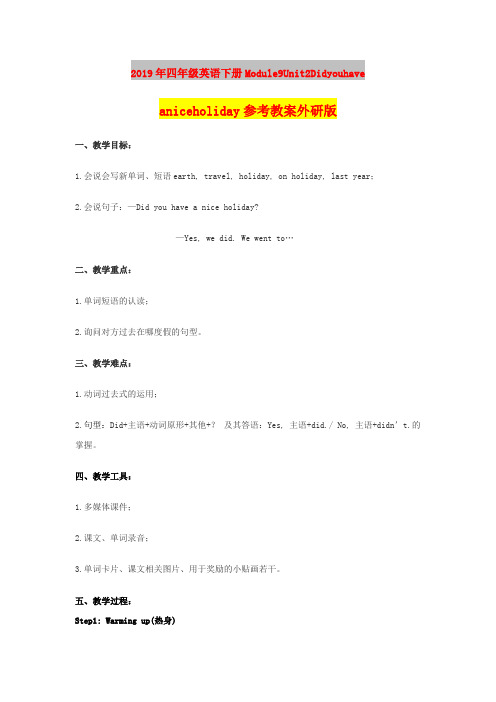
2019年四年级英语下册Module9Unit2Didyouhaveaniceholiday参考教案外研版一、教学目标:1.会说会写新单词、短语earth, travel, holiday, on holiday, last year;2.会说句子:—Did you have a nice holiday?—Yes, we did. We went to…二、教学重点:1.单词短语的认读;2.询问对方过去在哪度假的句型。
三、教学难点:1.动词过去式的运用;2.句型:Did+主语+动词原形+其他+?及其答语:Yes, 主语+did./ No, 主语+didn’t.的掌握。
四、教学工具:1.多媒体课件;2.课文、单词录音;3.单词卡片、课文相关图片、用于奖励的小贴画若干。
五、教学过程:Step1: Warming up(热身)活动一:唱一唱建议用时:2—3分钟教师播放歌曲大家一起跟着唱做,可以活跃课堂气氛,调动学生们的学习积极性。
Step2:Presentation(呈现新课)1.新课导入建议用时:2—3分钟活动二:口语练习教师播放PPT上关于度假的图片,比较两组句子“I am on holiday./ I was on holiday.”由此引出本课话题。
教师让学生说说自己都去过那些地方度假游完,在班里分享自己的经历。
以此引出本课话题。
活动三:知识回顾教师以旅游为话题带领学生复习上节课所学过的交通方式的英语表达,为本节课接下来要学习的内容做铺垫。
2.教授新知建议用时:2—3分钟教师播放课文第一部分Listen point and say的录音,让学生自己翻译出对话的意思,并且跟读录音。
最后由学生自己朗读句子并画出自己不认识的单词。
3. 学习新句型建议用时:2—3分钟教师给学生讲解第一部分对话中出现的新句型一般疑问句:Did+主语+动词原形+其他+?及其答语:Yes, 主语+did./ No, 主语+didn’t.4.课文学习建议用时:3—4分钟教师播放课文第二部分Listen and say的课文录音,学生先跟读后由教师领读并讲解。
- 1、下载文档前请自行甄别文档内容的完整性,平台不提供额外的编辑、内容补充、找答案等附加服务。
- 2、"仅部分预览"的文档,不可在线预览部分如存在完整性等问题,可反馈申请退款(可完整预览的文档不适用该条件!)。
- 3、如文档侵犯您的权益,请联系客服反馈,我们会尽快为您处理(人工客服工作时间:9:00-18:30)。
Module 9 Unit 2 Did you have a nice holiday教学目标1.知识目标:掌握本单元的新单词earth,复习上一单元的单词。
巩固本模块的重点句型:Did…?以及相应的回答。
2.能力目标:能够在时间练习中熟练的运用本模块的新词。
能运用本模块的知识对过去的动作提问,并能回答别人的提问。
3.情感目标:激发学生学习英语的兴趣,使学生养成勤于总结、勤于对比的习惯。
教学重难点教学重点:1.掌握本单元的新词:earth ,复习上一单元的单词。
2.巩固Did…?句型及相应的回答。
教学难点:运用本模块的知识对过去的动作提问,并能回答别人的提问。
教学准备课件,图片,点读笔,地球仪。
教学过程一、W arming up and Revision1.Free talkT:Hello,boys and girls. Welcome to our English class. Are you ready?Ss: Yes.T: Did you go to the park last Sunday?Did you go to school by bike last week?Ss:...2. Revision教师呈现以前学过的动词短语的图片。
学生看图片,说句子。
可以参考句型:Did he...? Yes,he did./No,he didn’t.3.Listen ,point and say.(1)教师播放动画,学生感知动画内容。
(2)教师出示地球的图片,讲解单词earth。
(3)学生听录音,跟读对话。
二、Presentation1.Listen and say.(1)教师播放动画,请学生找出新句型:Did you...?(2)教师出示中国地图的图片,并提问:Did you go to Hong Kong last year?引导学生回答:Yes,I did./No , I didn’t.I went to Shanghai .(3)学生用中国地图上的其他城市,替换香港和上海,继续操练该句型:Did you go to ... last year?Yes,I did./No , I didn’t.I went to ... .(4)教师出示长城的图片,并提问:Did you visit the Great Wall last year?引导学生回答:No, I didn't. I went to … .(5)教师出示其他标志性建筑的图片,继续操练句型:Did you visit ... last year?No, I didn't. I went to … .(6)教师出示各种交通工具的图片,操练句型:Did you travel by... ?Yes, I did./No, I didn't. I went there by....(7)学生听录音,回答问题。
1.Did Xiaoyong have a nice holiday?2. Where did Xiaoyong go?3.How did he go there?4.Did Xiaoyong see his friend Lili in Hangzhou?(8)Listen,read and choose.( )1.Did you have a _____holiday?A.funB.niceC.busy( )2.Did you go to _____?A.HangzhouB.ShenzhenC.Sanya( )3.We went there by_____.A.planeB.busC.train( )4.Did you visit_____?A.the Great WallB.Beihai ParkC.the famous West Park( )5.Did you see your ____Lili in Hangzhou?A.sisterB.auntC.friend(9)Fill in the blankMs Smart:Did you ____ a nice holiday,Xiaoyong?Xiaoyong:Yes,it ____ great!Sam:Did you ___ to Hangzhou?Xiaoyong:Yes. We ____ there by ____.Ms Smart:Did you ____ the famous West Lake?Xiaoyong:Yes. Look! It's very beautiful.Sam:Did you ____ your friend Lili in Hangzhou?Xiaoyong:No,she _____on holiday in Shanghai.(10)Role play三人一小组,分别扮演Ms Smart,Sam 和 Xiaoyong。
nguage point(1) 询问某人过去是否做了某事Did + 主语 + 做某事 + 时间?回答:---Yes,主语+ did. ---No, 主语+ didn’t.例:--- Did you live in the US last year?---Yes , I did.---Did she live in the US last year ?---No, she didn’t. She lived in China last year.(2)小练习。
按要求完成下列各题。
1.He lived in Washington DC. (变成一般疑问句)____ he _____ in Washington DC?2. Did you go to Beijing last year? (肯定回答)____, I ____.3.I went to China on holiday. (变否定句)I ______ _____ to China on holiday.4.Does he live in Shanghai last year? (改错)________________________________________________5. by, plane, I , travel (.) (连词成句)________________________________________________3.point,ask and answer.学生两人一组利用句型:A:I went to____last year.B:Did you travel by___.A:Yes,I did./No,I didn't.I went there by____.创编对话。
4.Listen and say.Then sing.(1)老师播放课本歌曲,学生第一遍听掌握主要内容。
(2)老师再次播放课本歌曲,学生跟着录音,朗读歌曲内容。
(3)全班分成两组,分别演唱歌曲。
(4)改编歌曲:学生6人一组,模仿课本歌曲,对歌曲进行改编。
改编后,老师请不同的小组展示改编好的歌曲内容。
5.Guess and say.教师准备表示地点的单词卡片。
学生两人一组,一名学生抽卡片,另一名学生猜地点。
句型:Did you go st year?Yes, I did./No,I didn't.I went to....6.Ask and answer.Then write.一名学生作为“小记者”去采访其他同学,并做好记录,整理成表格。
参考句型:Did you have a nice holiday?Yes,I went to....Did you go by...?No,I went by....Did you visit...?Yes,I did.三、Consolidation( )1.---Does he live in Shanghai?---________A. Yes, he is.B. Yes, he does.C. Yes, he did.( )2. We ____ to the earth last holiday.A. wentB. goC.will go( )3. Look ____ these photos.A. onB. /C. at( )4. Did you ____ your friend?A. seeB. watchC. look( )5. Did you go to Zhejiang ______?A. last holidayB. next weekC. tomorrow( )6. I visit _____ on holiday.A. Great wallB. the Great WallC. the great wall ( )7. I visited my grandpa ____ bus.A. takeB. inC. by( )8. _____ you at home yesterday?A. WereB. AreC. Did( )9. We want to _____ Beijing.A. visitB. lookC. watch四、Summary1单词 earth2. 句型Did you go st year?Yes, I did./No,I didn't.I went to....Did you travel …?Yes, I did./No,I didn't.I went there by….五、 HomeworkTalk about “What did you do last holiday?”with your partner. 【板书设计】Module9Unit 2 Did you have a nice holiday?单词:earth句子:Did you have a nice holiday?Yes,we did. We went to the earth.We went there by train.Did you visit the famous West Lake?Did you see your friend Lili in Hangzhou?。
